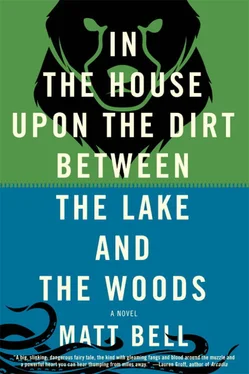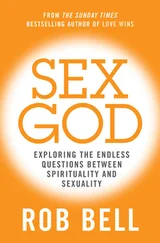And then back around the yard and onto the porch and inside the house, where my wife waited, where the shrouded foundling waited dumb in her arms.
And then outside again to hold the front door open so that my wife might carry her unremembered son out of our house, to lift him once more over the threshold and onto the dirt, and because I did not know where else to put him I buried him in the woods, in the same part of these new woods that I had claimed in the old, where I took the logs for our house, where I interred every beast I could. But all those days were gone, and I had promised this new woman whom I couldn’t not call my wife that I would stop speaking of them, and the digging took all morning, as my wife could not work the shovel, and I was too sick for fast work. And so another element of our world was ended, and I believed for a time that no more would come.
I avoided my wife’s blank gaze as I received the foundling’s body from her, and then I lowered her son into his grave, and then I took the two furs from my satchel to blanket them across his shape—and when that first shovel weight of dirt hit heavy upon the shroud, it was only I who cried.
IN THE WEEKS THAT FOLLOWEDI made my living again within the house, although I did not broach the borders of the marriage bed. Instead I took the crib and bassinet and rocking chair out onto the dirt, and in the yard I broke them, and then I made the nursery mine. Into it I gathered all the remaining artifacts of who we were, those same reminders that failed to stir my wife: the photographs of our wedding, the clothes we wore on our wedding day, still preserved, and also the gifts we had been given then, meant to start our life together. Emptied of those objects, the proper house became appropriately blank, and now those shapes that I could not discard would hurt me only in private, in the length of my sleepless, darkless nights.
There were no fish in the lake nor beasts in the woods, and so we ate from the small garden behind the house, where my wife’s garden had always been, where perhaps some garden had always been meant to go. There were no pests to eat her crops—but also no bees to fertilize them, no worms to upturn the dirt, and no proper sun to light them—and so what grew there was also odd, plentiful but misshapen, underripe, without much flavor but nutritious enough. It was an unworkable garden, one whose half-sung mechanism would eventually fail from incompleteness, and when I asked her where she found her first seeds, she said that she did not know, that the garden had always grown exactly this well.
I said, Did you forget, or did you never know?
I said, How long ago did you start to forget? Do you at least know that?
She knew so little, despite my long storytelling, and when despite my promises I again reminded her that once she was able to make this whole world we now lived in, had somehow carved it free from the black, then she shook her head, said it was I who was mistaken.
She said, Why would I make a world so unfinished, if I were making it for me? Do you think I adore emptiness, or else a creation incomplete? When you speak of a bird, its wings, its feathers, I think to myself, That is something I would like to see. When you tell me of the bear, I wonder what its fur felt like under your hands and how its spoor smelled and how terribly frightening its roar must have been, even before it was the broken thing I saw from my window. And these fish you speak of, sparkling silver, why would I not want to feel their swimming around my ankles, the smallest minnows nipping at my toes, as if it were they who were meant to eat me, instead of the other way around?
I said, Once you did know.
I said, It was you who made this place.
My wife shook her head again, touched my face with her now-cool fingers. She said, How do you know these things about me? How do you pretend to know?
I said, Once you brought your son here to escape me, but there couldn’t have been this world, waiting. This is a remaking of the world we shared, the only world your son had ever known.
I said, You tried to make him a home, and for some time you succeeded.
My wife again wanted to speak, but first she stared off into the twilit sky, the dark-that-was-not-dark of our morning. She was again so beautiful, her grace terrible in equal proportion to her sadness, and after she gathered herself she said, No, this world has always been here. I did not make it. Always it was here, waiting for me to find my way.
She said, I have listened to your story and I have been moved by your words, but I do not believe you are my husband, that the boy we buried was my son.
And then I knew I should have shown her the foundling’s face, what was left of his face, how her song had made his into hers, had claimed even his nose and mouth and eyes, made them as hers were made, adopting him not just in claim but also in shape, and had I proved the foundling I would have proved it all.
My wife listened to my words, considered my trembling insistence, then said, It would not have mattered.
She said, While you slept, I opened his shroud myself and saw nothing like what you say I should have seen. Just a dead boy, whose death meant nothing to me.
Every day after I woke up to the same old touches, mindless now but still hot and cold, thick and thin, beneath and atop my skin. I coughed, spit up into the bucket I had left there for just this purpose, and when I was finished I took the bucket outside and limped it down the path to the lake, where I dumped its runny contents into the waters. There tiny black fish swam into the shallows to eat this bloody vomit, and I did not tell my wife I recognized them but rather kept their existence to myself.
A new secret then, but even if I had told her, would she have understood? Could she have looked into the water to see that the slim length her body aborted was become a school of fish or something like fish, as hungry for their father’s flesh now as when they were younger and meant to be a boy?
And so I said nothing. And so I continued to say nothing, even as other signs began to reappear, recur: Because I was sick I could rarely stand more than a few bites of what we gathered from the garden, and after each such meal, my wife asked me why I did not eat, and when I did not answer, she asked what she had done wrong in the kitchen. I hurt her anew as she asked again every evening, my mere presence enough to reintroduce doubt, my voice and my actions or lack of action enough to allow the reentry of guilt, that emotion I had carried from the top of the world to its very bottom, where now it pooled and stained all that I touched, all those I longed to touch, and it was after the frustrations of one of these late meals that we first heard the voices, the high laughter from within the woods, cut through the stillness of the dimming light, the unbroken content of our evening.
I did not hear before my wife heard, did not hear until after she asked me and asked me again if I did, but then afterward what withered flesh that sound made, my skin pebbled along every nerve line, the shivers of recognition jerking me from my chair. Together my wife and I rushed toward the woods, but she arrived there faster, possessed of a new youth, her body restored as fully as her mind was not. From farther ahead her voice called out for me to hurry, and although I wanted to respond, all that breath was already engaged in moving my bones toward her and the voices beyond, and any speech I would have made would not delay the process, and then anyway I was soon enough arriving, looking up from watching my feet to spy my wife, tall and pale and stunned, some short distance across the tree line, and there to see how she was surrounded: by the foundling, by a new crowd of foundlings.
AT THE EDGE OF THEwoods stood some small number of sons, all so similar at first but marked apart the more I looked. The foundlings were all their own ages, for one thing, and each carried a slightly shifted face upon its head, a different expression of lips and mouth and teeth. Their appearance put my heart to pounding but did not disturb my wife, who already knelt before their approach, bidding them to come to her, inviting their hands upon her face and body. She gathered these boys close, took some into her arms, and there I saw a mockery of the family I had wanted, some clutch of children encircling this one woman, this woman I had always wanted above all others, and my face twisted as I saw a seventh son wandering out of the thicker brambles, stumbling with his face struck wide across the forehead—as if bleeding from the blow of a boat, as if struck hull across head—impossibly saying MOTHER, saying MOTHER wetly, with lungs soaked and sodden from a lake, and again he said MOTHER, MOTHER, and then all that water inside followed his voice out, spilling onto the forest floor, soaking his words into its soil.
Читать дальше












